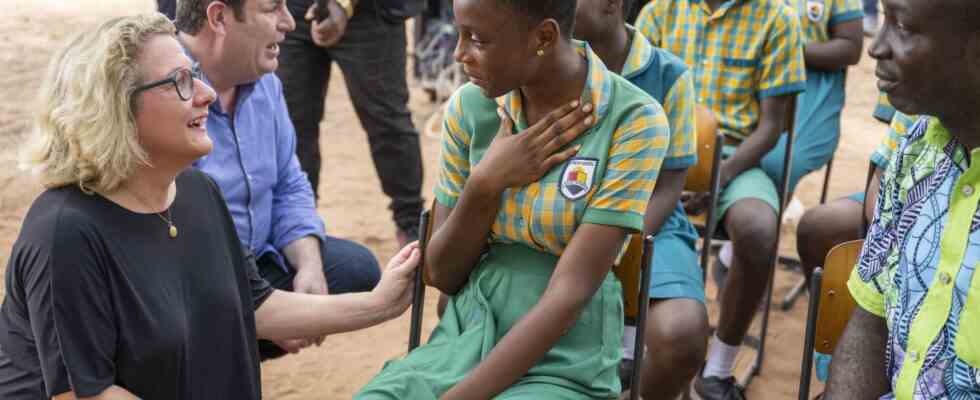As of: 02/24/2023 6:57 p.m
Ghana and Côte d’Ivoire have an abundance of labor and agricultural commodities such as cocoa. The German economy urgently needs both. What effect can Ministers Heil and Schulze have in the region?
Black, red, yellow balloons hang on the door frame, and there are also a few green ones: This means that all colors are available with which you can represent the two relevant national colors – those of Germany and Ghana. The speeches are always about a “win-win situation” and time and again there is a benevolent nod from all sides.
Then the time has come: Development Minister Svenja Schulze and EU Ambassador Irchad Razaaly unveil the “Ghanaian-European Center for Jobs, Migration and Development” in Ghana’s capital Accra.
The name says it all: It is about important issues for Ghana and Germany, including labor migration, a hot topic at least in parts of German society.
Labor Minister Heil and Development Minister Schulze are in Ghana for the inauguration of a migration center
Norbert Hahn, ARD Nairobi, daily news at 12:00 p.m., February 21, 2023
A center as a signal
Labor market researchers have determined that a “net immigration” of 400,000 people per year is necessary. If you include the departures from Germany, it should even be more than a million.
There is already a shortage of skilled workers everywhere, from IT specialists to nurses. According to the researchers, they could not all come from Europe. So also from Ghana?
In any case, the center in Accra is to become a blueprint for eight more in Morocco, Tunisia, Egypt, Jordan, Nigeria, Iraq, Pakistan and Indonesia. The Schulze Ministry has earmarked 150 million euros for this.
The interest: clear
For decades the motto towards Africa was: stay where you are! Well then: Come if you can!
But those who have expertise or are on the way are reluctant. Because Germany is neither historically connected to Ghana nor speaks the same language, the interest is clear at first glance.
You can easily find out more at the food stands near some of the university institutes in the center. Bernhard Kopo, for example, who studies international business, can imagine a job in the USA, while his friend Collin Apiya wants to go to Canada. Germany? Well, go if you have to, the two say.
Obstacles shape the picture
A few kilometers away from Ghana, IT engineer Anita Twumasi Ankrah is testing online software for German companies. She doesn’t necessarily want to go to Germany either.
Language skills and bureaucratic hurdles are a deterrent – and so are my own experiences: “Years ago, when I tried to go to Germany with my parents to attend my brother’s wedding, we were refused a visa. I had the feeling that it might not be that easy, to come to Germany.”
When asked whether the experience affected her view of Germany, she said with a straight face: “Yes – that’s the way it is!”
“Migration will continue to increase”
For Gilbert Houngbo, Director General of the International Labor Organization (ILO) and travel companion of Schulze and Heil, the minister duo is on the right track:
It is clear that global labor migration will continue to increase because of structural inequality. We see societies in the North aging, facing demographic challenges. And in the Global South we have youth unemployment at the same time.
When it comes to fair supply chains, it is always about cocoa. Schulze and Heil found out about growing conditions in the Ivory Coast.
Image: dpa
The second construction site: the supply chain law
It won’t be easy with the specialists from the south. This also applies to the second topic of the traveling salesman from the north: the supply chain law, which is intended to eradicate child labor on the cocoa plantations in Ghana and Ivory Coast, fair prices for the farmers and generally better working conditions.
The law requires strict bookkeeping because the production chain from the farmer to the manufacturer must be shown – with proof that it is impeccable in terms of human rights. The industry rejects them because they hinder investment.
Schulze and Heil, on the other hand, see a “win-win” situation here too, with which Germany and the EU can score points in the world of tomorrow.
The following applies to both topics: The concern is commendable, but the hurdles are high. It will take some time to see if reality shifts with the paradigms.

